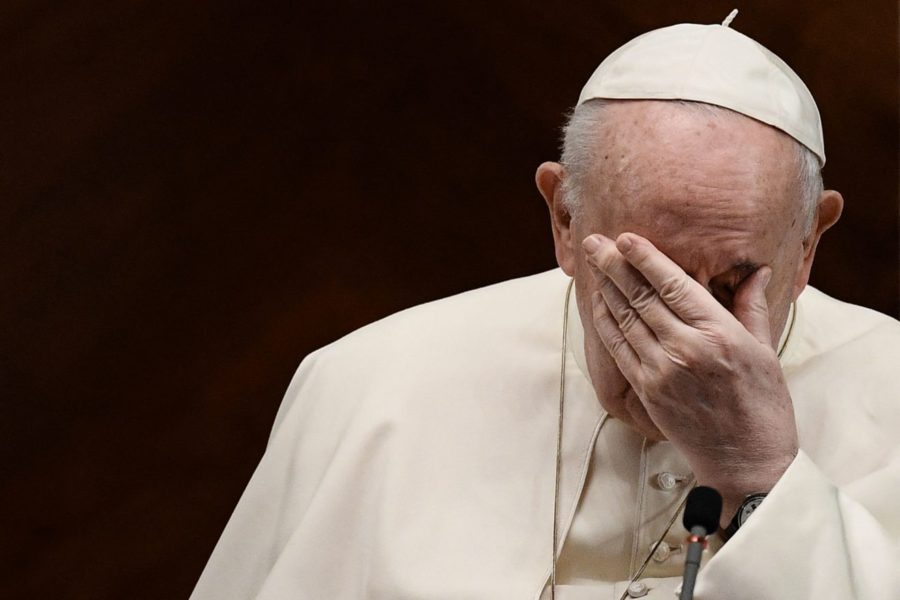LESBOS, Greece — In a visit aimed at pricking Europe’s conscience, Pope Francis returned Sunday to Lesbos, the Greek island that has come to symbolize the continent’s migration crisis.
“We are in the age of walls and barbed wire,” the pope said in a tent set up at the waterfront Mavrovouni refugee camp, a cluster of white containers surrounded by barbed wire. “Let us stop this shipwreck of civilization!”
The 84-year-old pontiff traveled to the island as part of a trip to Greece and Cyprus that has focused on drawing attention to the plight of asylum seekers as European countries take a harder line to prevent a new migrant influx.
“It is distressing to hear of proposals that common funds be used to build walls and barbed wire as a solution,” he said in a speech to camp residents and visiting dignitaries. “Problems are not resolved, and coexistence improved by building walls higher, but by joining forces to care for others according to the concrete possibilities of each and in respect for the law.”
Since 2015, Lesbos has been one of the main entry points into the European Union for migrants and refugees fleeing war and poverty in the Middle East, Asia and Africa.
The numbers arriving on the island have receded significantly since the EU struck a deal with Turkey in 2016 to manage refugee flows, but migrants continue trying to reach Europe by boat across the Mediterranean, frequently with fatal results.
“The Mediterranean, which for millennia has brought different peoples and distant lands together, is now becoming a grim cemetery without tombstones,” Pope Francis said. “This great basin of water, the cradle of so many civilizations, now looks like a mirror of death.”
His audience included Greek President Katerina Sakellaropoulou, European Commission Vice President Margaritis Schinas and Greek Migration Minister Notis Mitarachi, as well as dozens of camp residents mainly from Afghanistan, Iraq and Central Africa.
Pope Francis first visited Lesbos in 2016, helping draw international attention to the island amid the crisis triggered by refugees fleeing the civil war in Syria.
“At that time, the situation was a humanitarian emergency, with more than a million new arrivals to Greece between 2015 and 2016,” said Louise Donovan, a spokesperson for the U.N. High Commissioner for Refugees. “The situation has drastically changed since then, and while it is no longer an emergency, shared responsibility, humanity and solidarity are needed now more than ever.”
Sunday’s papal visit “is an opportunity to focus and reflect on the common values of solidarity, of humanity and of respect for human life and dignity,” Donovan added.
During an emotional meeting with migrants in Cyprus on Friday, the pope departed from a prepared speech, insisting he had a responsibility to tell the truth about the suffering of refugees, and comparing their conditions to Nazi and Soviet camps.
“We are appalled when we read stories of the concentration camps of the last century, those of the Nazis or those of Stalin,” he said. “We say: ‘How could this possibly have happened?’ Brothers and sisters, it is happening today, on nearby coasts.”
Earlier this year, Greek authorities and the European Commission inaugurated three new refugee centers on the Greek islands of Samos, Kos and Leros. Though the EU-funded facilities are widely considered to be of a higher standard than earlier camps, critics complain they are remote and heavily policed.
Amnesty International said the new detention camps violate Athens’ commitments to provide international protection to those in need and urged authorities to lift restrictions imposed on residents. Last week, the rights group accused Greek authorities of holding asylum seekers illegally at the Samos camp.
Some 2,200 are still living in the Mavrovouni holding center, which was constructed as a temporary solution after a fire destroyed a notoriously overcrowded camp at nearby Moria.
A new center to replace Mavrovouni’s containers was supposed to be up and running before last winter but has been delayed by local authorities contesting any permanent construction. North Aegean Regional Governor Kostas Moutzouris said he hoped the pope’s appeal would not lead to more migrants heading to the Greek islands.
“We welcome the pope’s second visit and hope that it will mark the rapid departure of all migrants from our islands,” he told POLITICO after the pope’s departure. “We hope it will not lead to the start of any migration movements to Lesbos. We won’t allow any permanent construction on the island.”
Asylum seeker Kamille Mobaki, from Congo, was also hopeful the papal visit would help get him off the island.
“I’m excited for his visit and I’m stressed,” Mobaki, 31, said as he waited in a tent for the pope to arrive. “Maybe he will take us up to Italy, maybe this will be a solution for us.”
Mobaki has been stuck on Lesbos for nearly two years and has had asylum requests rejected twice.
During his first visit to Lesbos, Pope Francis took a number of Syrians with him back to Rome, and in Cyprus last week the Vatican announced 12 migrants who had crossed over from the breakaway Turkish Cypriot north of the island would be soon relocated to Italy. Cypriot officials later said a total of 50 would be sent.
Among them are two Cameroonian students stranded for six months in the no-man’s-land dividing the island.
Greek media has been rife with rumors that the pope would take another 300 people with him from Lesbos, but no such plans were announced as he left the island after the two-hour visit.


